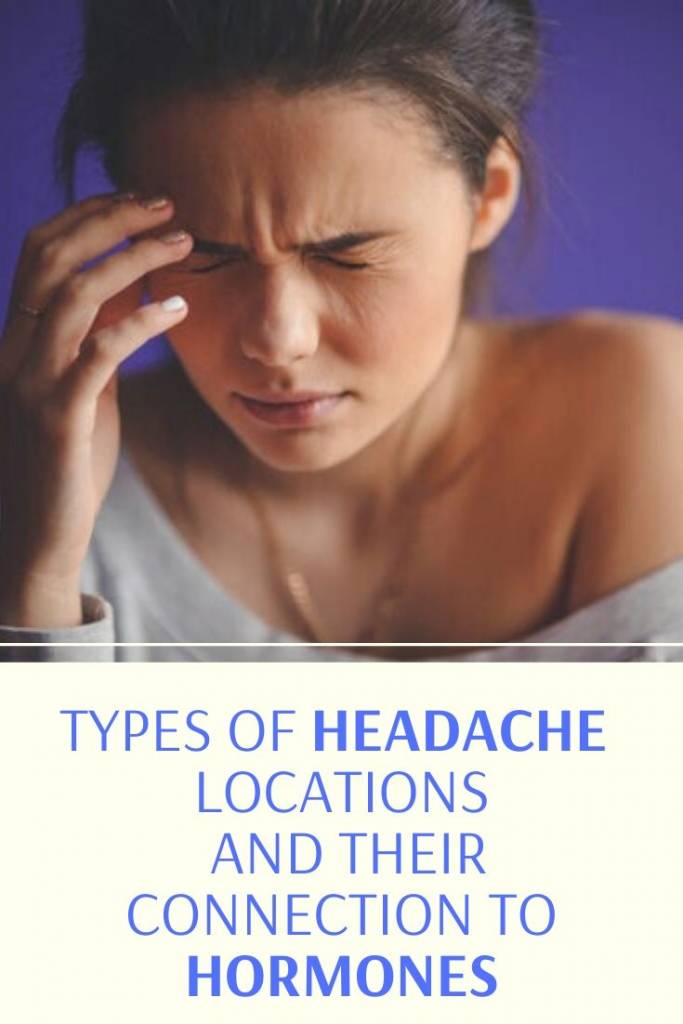Discover the types of headaches and location on your head which are caused by some hormonal changes. There’s a close link between headaches and hormones.
Headache is a very frequent symptom that we can experience for numerous causes. Almost any pathology can be expressed with this sign, from a cold to a vision problem. However, do you know the relationship between headaches and hormones?
Although many people ignore it, hormonal imbalances can trigger numerous discomforts, especially in women. This is because, in women, hormones fluctuate during the menstrual cycle – which lasts approximately 28 days.
Similarly, they also vary according to the stage of life. The most important hormones in women are estrogen and progesterone. In this article we explain to you what their relationship to headaches is and what to do to solve them.
Types of headaches and location and their relation to hormones
Thanks to numerous studies, scientists have been able to verify that certain headaches are more frequent in women than in men. Specifically, women are more likely to suffer from migraines and tension headache.
Migraines consist of a sharp, sharp headache that is usually felt on only one side of the skull. This pain is accompanied by other symptoms such as sensitivity to light and nausea.
Further info: Prepare This Migraine Headache Treatment At Home And Get An Instant Relief! INCREDIBLE!
On the other hand, tension headache causes a more widespread headache. It may be difficult to differentiate it from migraine, but there are some distinctions. For example, migraines usually get worse when you exercise, while tension headache does not.
The fact that both pains are more frequent in women suggest that there is a hormonal component that causes them. In addition, this hypothesis gains more strength due to the fact that most women usually experience them at the same time of the menstrual cycle.
Interestingly, a lot of these pains appear just before menstruation begins. This is related to the drop in estrogen levels typical of the end of the menstrual cycle.
What are the symptoms for hormonal changes?
While it is true that most women experience these headaches just before menstruation, there are variations. In some cases the headache appears days before. However, in others, it predominates throughout the period.
In addition, this also varies according to the age of the woman. As menopause approaches, the incidence of these pains increases. This occurs because, during this stage, estrogen levels fluctuate remarkably.
The intensity of this symptom can become very disabling. Keep in mind that hormonal variations also often cause other symptoms. For example, pain in the belly or mood changes. Therefore, we must do everything possible to reduce the inconvenience to those who suffer.
How can you treat these headaches?
Headaches related to hormones can be treated. In fact, there are numerous treatments that have proven effective. However, they should adjust and adapt to each woman and her preferences. Some of them are:
- Apply ice over the area and do relaxation exercises.
- Take analgesics. The most recommended is to use nonsteroidal anti-inflammatory drugs (NSAIDs). For example, ibuprofen. They can be taken preventively before the pain appears or once established.
- Use hormonal contraceptives.
Hormonal contraceptives help many women reduce fluctuations in hormones. This makes much of the headaches improve or reduce their frequency. The most commonly used contraceptives are in the form of pills, patches or vaginal rings.
However, the effect of this measure depends on the woman. There are many who do not notice this relief with contraceptives. Other recommended measures are to avoid stress, caffeine and tobacco. It seems they could make the pain worse.
The use of oral contraceptives causes a hormonal imbalance when left. It can be alleviated with a good diet.
Oral contraceptives are a powerful pharmacological tool to control headaches caused by hormones
In conclusion
Headaches have a great relationship with hormones, especially in women. The fact that the estrogen concentration varies during the menstrual cycle has been associated with this symptom.
Every woman experiences it in a different way. In addition, not all respond equally to the same treatment. Therefore, it is very important to see a doctor and be aware that the same remedy does not work for all cases.
Don’t forget to SHARE the types of headaches and location and their connection to hormones with your friends and family on your social networks!

